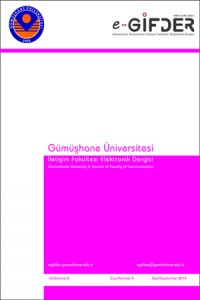Abstract
-
Keywords
References
- ALTAN, H. Zeynep (2008). “Bir Sürgünlük Biçimi: Metropol Yaşamı”, İstanbul Üniversitesi İletişim Fakültesi Dergisi, Sayı: 34, s. 5-21.
- BÜKER, Seçil; Topçu, Gürhan (2008). Tarih/Kuram/Eleştiri, Ankara: Gazi Üniversitesi İletişim Fakültesi Kırkıncı Yıl Kitaplığı No:10.
- ESKİN, Mehmet (2001). “Ergenlikte Yalnızlık, Baş Etme Yöntemleri ve Yalnızlığın İntihar Davranışı ile İlişkisi” , Klinik Psikiyatri Dergisi, 4, 5-11.
- FORDHAM, F. (2001). “Jung Psikolojisinin Ana Hatları”, İstanbul: Say Yayıncılık.
- HOCKLEY, Luke (2004). Film Çözümlemesinde Jungcu Yaklaşım, İstanbul: Es Yayınları.
- KILINÇ, Hicran; SEVİM, Seher (2005). “Ergenlerde Yalnızlık ve Bilişsel Çarpıtmalar” Ankara Üniversitesi Eğitim Bilimleri Fakültesi Dergisi, Cilt: 38, Sayı: 2, s. 67-89.
- KOESTENBAUM, Peter (1998). Varoluşçu Cinsellik, (Çev: Nur Yener), İstanbul: Okyanus Yayıncılık.
- LLOYD, Genevieve (1993). Erkek Akıl, (Çev: Muttalip Özcan), İstanbul: Ayrıntı Yayınları.
- MARAR, Ziyad (2004). Mutluluk Paradoksu – Özgürlük ve Onaylanma, İstanbul: Kitap Yayınevi.
- MAY, Rollo (2013). Kendini Arayan İnsan, (Çev: Kerem Işık), İstanbul: Okuyan Us Yayınları.
- ÖZDEN, Zafer (2000). Film Eleştirisi, İstanbul: Afa Yayıncılık.
- PARKER, Ian; SPEARS, Russel (2001). “Psikoloji ve Toplum”, Ankara: Rastlantı Yayınları.
- PÜSKÜLLÜOĞLU, Ali (2005). Türkçe Sözlük, Ankara: TDK Yayınları.
- VASSAF, Gündüz (1999). Cehenneme Övgü – Gündelik Hayatta Totalitarizm, İstanbul: İletişim Yayınları.
Abstract
ÖZET
Issız Adam filminin gösteriminden sonra “ıssız” olarak tanımlanan ya da tanımlanmak istenen bir erkek tipinin varlığı üzerine söylemler üretilmiştir. Bu söylemler gündelik yaşam içinde erkek-kadın ilişkilerinin ön plana çıktığı iletişim ortamlarında sıradan insanın gündemine girmiştir. Günümüzde, cinsiyet politikalarının hızlı değişimler geçirdiğini özellikle film ve dizilerle toplumda yeni yaşam biçimlerine kaynaklık ettiğini görüyoruz. Nitekim Film Mor tarafından düzenlenen, erkek egemen bakış açısıyla çekilen cinsiyetçi filmleri teşhir etmek üzere yola çıkan Altın Bamya Ödülleri’nden birinin “Issız Adam” filmine layık görülmesi; bu filmin aşk filmi olmanın ötesinde nasıl bir metin olduğunun incelenmesini cazip hale getirmektedir. Kimi bakış açılarına göre “cinsiyetçi” olarak nitelenen bu film gerçekte öyle midir? Issızlık, erkek egemen kültürün bir iletişim ya da iletişimsizlik kodu mudur? Bu bağlamda ıssızlık kavramının bir uzam yerine bir insanı dahası belirli özellikleri olan bir erkeği nitelemesi neyi ifade eder? Film metninin kendisi, toplumda uyandırdığı bu etkileri karşılayacak bir söylemi üretmiş midir? Söz konusu soruları yanıtlamaya odaklanan bu çalışma, Umberto Eco’nun “metnin niyeti” olarak sözünü ettiği kavram üzerinden giderek ıssızlığın psikanalitik açılımlarını ortaya koymayı amaçlamaktadır. Bu bağlamda çalışmanın inceleme nesnesi film metnidir, yöntemi ise psikanalizdir. Araştırmanın bulgularına göre; “Issız Adam” filmi kadın-erkek ilişkilerini düzenleyen toplumsal kodların yeniden yorumlanmasını olanaklı kılmıştır. Dolayısıyla filmi “cinsiyetçi” olarak nitelendirmek uygun değildir.
Anahtar Sözcükler: Issızlık, Toplumsal Cinsiyet, Psikanaliz
MEANINGS OF DESOLATION FROM THE MOVIE “ISSIZ ADAM” (ALONE, 2008)
ABSTARCT
After the first release of the film Issız Adam, people argued about a type of a man identified as lonely or isolated. These arguments and discourses mostly focused on relationships of man and woman in daily life held a large place in social agenda. Today, we see that gender politics bring us fast changes; especially they become important sources of having new life styles with the effects of popular films and series. By the way, it is interesting that the film Issız Adam is chosen for the Altın Bamya Awards by Film Mor in order to show how this film is expressing sexism. Giving Issız Adam a reward in such an ironic way and purposing to announce the films produced with patriarchal codes, forces us to analyze this film with a view far from a category of love films. İs this film has a sexist discourse as qualified by some people? ‘Being isolated’ or ‘lonely’… Is it a communication code of patriarchal culture or a code of communication gap? Through these questioning; What is the meaning of being isolated as a notion? What is the use of focusing on this notion as a feature of a man instead of showing a property of sacred or desert places? And we have to ask one more question; Is the film text has a content required questioning in this way by the audience and reviewers? This research trying to answer all these questions, focuses on the notion, intention of text, as Umberto Eco figures out in his semiological studies. And we purpose to investigate the meaninngs of being isolated by the help of physcoanalytical film method. So the object of this study is the film text and the method is physcoanalysis. As a result, this film has made it possible to interpret the social codes in relationships of man and woman again. So it is unnecessary for us to blame the film as a “sexist” text.
Key Words: Desolution, Social Gender, Physcoanalysis
Keywords
References
- ALTAN, H. Zeynep (2008). “Bir Sürgünlük Biçimi: Metropol Yaşamı”, İstanbul Üniversitesi İletişim Fakültesi Dergisi, Sayı: 34, s. 5-21.
- BÜKER, Seçil; Topçu, Gürhan (2008). Tarih/Kuram/Eleştiri, Ankara: Gazi Üniversitesi İletişim Fakültesi Kırkıncı Yıl Kitaplığı No:10.
- ESKİN, Mehmet (2001). “Ergenlikte Yalnızlık, Baş Etme Yöntemleri ve Yalnızlığın İntihar Davranışı ile İlişkisi” , Klinik Psikiyatri Dergisi, 4, 5-11.
- FORDHAM, F. (2001). “Jung Psikolojisinin Ana Hatları”, İstanbul: Say Yayıncılık.
- HOCKLEY, Luke (2004). Film Çözümlemesinde Jungcu Yaklaşım, İstanbul: Es Yayınları.
- KILINÇ, Hicran; SEVİM, Seher (2005). “Ergenlerde Yalnızlık ve Bilişsel Çarpıtmalar” Ankara Üniversitesi Eğitim Bilimleri Fakültesi Dergisi, Cilt: 38, Sayı: 2, s. 67-89.
- KOESTENBAUM, Peter (1998). Varoluşçu Cinsellik, (Çev: Nur Yener), İstanbul: Okyanus Yayıncılık.
- LLOYD, Genevieve (1993). Erkek Akıl, (Çev: Muttalip Özcan), İstanbul: Ayrıntı Yayınları.
- MARAR, Ziyad (2004). Mutluluk Paradoksu – Özgürlük ve Onaylanma, İstanbul: Kitap Yayınevi.
- MAY, Rollo (2013). Kendini Arayan İnsan, (Çev: Kerem Işık), İstanbul: Okuyan Us Yayınları.
- ÖZDEN, Zafer (2000). Film Eleştirisi, İstanbul: Afa Yayıncılık.
- PARKER, Ian; SPEARS, Russel (2001). “Psikoloji ve Toplum”, Ankara: Rastlantı Yayınları.
- PÜSKÜLLÜOĞLU, Ali (2005). Türkçe Sözlük, Ankara: TDK Yayınları.
- VASSAF, Gündüz (1999). Cehenneme Övgü – Gündelik Hayatta Totalitarizm, İstanbul: İletişim Yayınları.
Details
| Primary Language | Turkish |
|---|---|
| Journal Section | Articles |
| Authors | |
| Publication Date | October 15, 2014 |
| Submission Date | October 15, 2014 |
| Published in Issue | Year 2014 Volume: 2 Issue: 4 |

